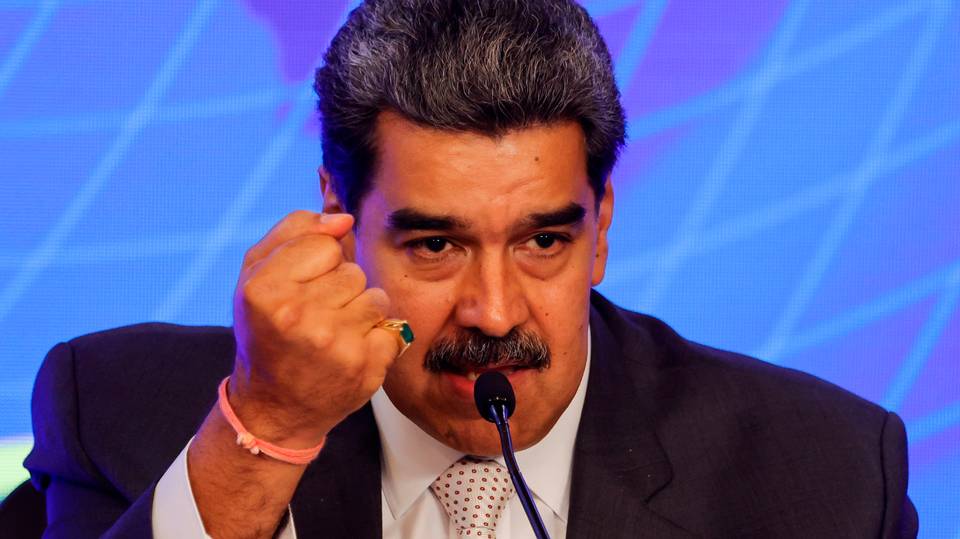Venezuelan dictator Nicolás Maduro is known to make outlandish statements, but his latest threat to invade neighboring Guyana and take control of its fabulous oil reserves should not be taken lightly.
Maduro is politically cornered, and he may use an escalation of Venezuela’s long-standing dispute with Guyana as an excuse to postpone his country’s 2024 elections. Much like Argentina’s military dictatorship invaded the Falkland/Malvinas islands in 1982, Maduro may hope that a border skirmish or a military takeover of the disputed Esequibo region — which most Venezuelans consider part of their country — would eclipse all other political issues.
In recent days, Maduro has made explicit threats to take over Guyana’s Esequibo area. In a Dec. 5 speech, he held a map titled “The new map of the Bolivarian Republic of Venezuela” that includes the Esequibo area, and announced plans to create a new Venezuelan state there.
The Esequibo region makes up about three quarters of Guyana’s entire territory.
“The Esequibo is ours,” Maduro said, in his televised address to military and government officials. He also announced creation of a Venezuelan military zone in that region, and said that he will order Venezuela’s state oil company PDVSA to start exploring oil there. He added that he will give Venezuelan citizenship to the region’s estimated 125,000 residents.
Guyana is taking the threat seriously, and is asking the United Nations Security Council to demand that Venezuela respect current international borders. In an interview with my colleague Jacqueline Charles of the Miami Herald, Guyana president President Irfaan Ali called the move by Maduro “reckless.”
The U.S. Southern Command started joint flight operations within Guyana on Dec. 7 “to enhance security partnership” between the two countries, according to a statement by the U.S. embassy in Guyana.
Brian Fonseca, a Latin America expert at Florida International University, told me that “there are certainly real motivations for Maduro to take this region.”
Politically, Maduro has recently suffered a string of defeats. Despite controlling the media and banning virtually all leading opposition candidates from running for the presidency, the opposition ran an independent primary election in which hard-line government critic Maria Corina Machado won with 93% of the vote.
More importantly, an estimated 2.3 million Venezuelans participated in the oppositions’ primary — much more than its own organizers had expected. Days before the primary, an opposition organizer had told me that, with luck, 1.5 million Venezuelans were likely to vote.
In an effort to recover from that setback, Maduro convened a Dec. 5 national referendum on annexing Esequibo, reviving the ancient dispute over that area. But contrary to Maduro’s claim that more that 10 million Venezuelans voted, journalists and independent observers noted that voting booths were almost empty, and that not more than 2.5 million people may have cast votes.
Maduro’s popularity is at 14%, according to a September ORC poll. Despite controlling the electoral tribunal and being able to fraudulently alter the results, as he did when he re-elected himself in 2018, Maduro would have a hard time convincing even his own followers that a 2024 re-election would be legitimate.
Militarily, Guyana is no match for Venezuela. According to Britain’s International Institute for Strategic Studies’ database, Venezuela’s armed forces have 123,000 regular troops and 400,000 paramilitary and militia members. By comparison, Guyana’s defense force has 3,500 troops, and 25,000 paramilitary members. “It’s a David and Goliath situation,” Fonseca says.
There has been speculation in the media that Maduro has revived the Esequibo conflict to divert public attention from his latest round of repression. Last week, the Maduro regime issued warrants for the arrest of a dozen leading opposition politicians, including the now exiled former interim president, Juan Guaidó, for “treason to the fatherland.” They are accused of allegedly conspiring to spoil Maduro’s referendum on the Esequibo region.
Other experts speculate that Maduro may have escalated the border conflict in order to increase his leverage in negotiations with Washington. The Biden administration and the Maduro regime are negotiating the relaxation of U.S. sanctions in exchange for Venezuela allowing free elections next year.
Maduro knows that President Biden would not want a war in Latin America in a U.S. election year. Thus, the Venezuelan dictator may want to step up the border conflict as a new negotiating card to obtain U.S. concessions, supporters of this theory say.
Maybe so. Still, the most convincing reason that Maduro is threatening to invade Guyana is that he knows that he is likely to lose the 2024 elections by a landslide, and is looking for a reason to cancel them.
Nationalism has always been the last refuge of scoundrels, and Maduro is no exception to the rule. Washington and democracies around the world should not let him get away with an invasion of a neighboring country, nor with using this dispute as an excuse not to hold Venezuela’s scheduled 2024 elections.
As originally published in the Miami Herald.
Featuring expertise and quotes from Gordon Institute Director Brian Fonseca
Brian Fonseca is Director of the Jack D. Gordon Institute for Public Policy and an adjunct professor in the Department of Politics and International Relations at Florida International University’s (FIU) Steven J. Green School of International and Public Affairs. He is the founding Executive Director of Cybersecurity@FIU, FIU's university-wide interdisciplinary emerging preeminent program.
